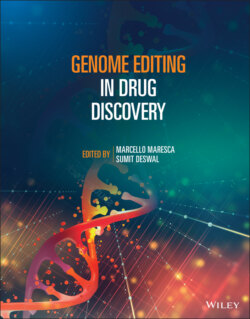Читать книгу Genome Editing in Drug Discovery - Группа авторов - Страница 9
Preface
ОглавлениеThe development of CRISPR‐Cas9 for genome engineering has revolutionized the field of genome editing. Many of the cell types and animal models previously very challenging to genetic engineering, can now be engineered with high efficiency and precision using CRISPR‐Cas9‐derived tools. This has led to the development of many novel disease models helping scientists to better understand disease biology as well as providing opportunity to test novel therapeutics. By performing large‐scale functional genomics screens with CRISPR‐Cas9, it is now possible to identify and validate drug targets at a much faster rate and better precision. By assessing gene function comprehensively at large scale and in relevant cell type in early stages, candidate attrition rate is reduced. Genome editing is now part of almost every step in the early part of drug discovery pipeline, from target identification and its validation to mechanistic studies in relevant disease models. In addition, genome editing is used as a promising platform for gene therapy and molecular diagnostics.
We felt a need for a book comprehensively covering these important aspects of genome editing in drug discovery and therapy. Such a book will be of very much interest for those performing genome editing in research institutes or applying genome editing to drug discovery projects at pharmaceutical industries. Such a book will also help students of molecular biology, biotechnology, biochemistry, and pharmaceutical sciences to better understand this very important technology and to exemplify how basic research on a bacterial immune system can have such a big impact in life sciences.
We would like to thank staff at Wiley, especially Jonathan Rose, who first proposed the idea of this book. We would like to thank all the authors who spent their precious time in making this book a reality. Each of the chapter is written by experts on the respective topic working in top pharmaceutical/biotechnology companies or academic institutes.
We would also like to thank colleagues and management at AstraZeneca, Mohammad Bohlooly, Steve Rees, Mike Snowden, and Mene Pangalos for supporting us and allowing us to devote our time for such an academic exercise.
Marcello Maresca and Sumit Deswal
Gothenburg, SwedenApril 2021
